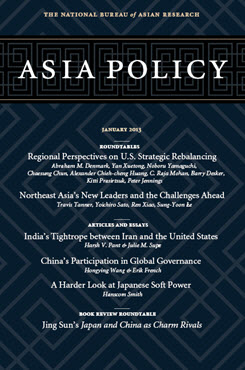China's Participation in Global Governance from a Comparative Perspective
This article examines comparative data on countries’ participation in global governance and explains China’s relatively low involvement in global governance.
EXECUTIVE SUMMARY
MAIN ARGUMENT
Compared with the other emerging powers in the so-called BRIC group (Brazil, Russia, India, and China), China has underparticipated in global governance in terms of contributing personnel, finance, and ideas to major multilateral institutions and programs. This article seeks to answer the question of why China has not become more involved in global governance from the perspectives of both supply and demand. The low supply of China’s contributions results from the limited interest of the Chinese government and limited capacity of both the government and Chinese society. The low demand for China’s involvement in global governance is due to the continued ambivalence of the international community toward China. The U.S. and other countries should, and to a limited degree can, encourage China to take on a bigger role in providing global public goods.
POLICY IMPLICATIONS
- China has maintained a low profile in global governance, despite its growing economic power and the rhetoric of being a responsible great power, and there is little evidence that it will seek international leadership. Contrary to concerns over China’s imminent takeover of the U.S. role in the world, Beijing appears to have limited interest in and capacity for greater involvement in global governance.
- Because the domestic and international sources of this relative passivity in global governance are rooted in the Chinese political system, political reform in China would likely increase its capacity and status as an international leader.
- The U.S. and other external actors can encourage and enable China to play a bigger role in providing global public goods by promoting the growth of Chinese civil society and more fully embracing China as a member of the international community.
About Asia Policy
Asia Policy is a peer-reviewed scholarly journal presenting policy-relevant academic research on the Asia-Pacific that draws clear and concise conclusions useful to today’s policymakers. Asia Policy is published quarterly in January, April, July, and October and accepts submissions on a rolling basis. Learn more


